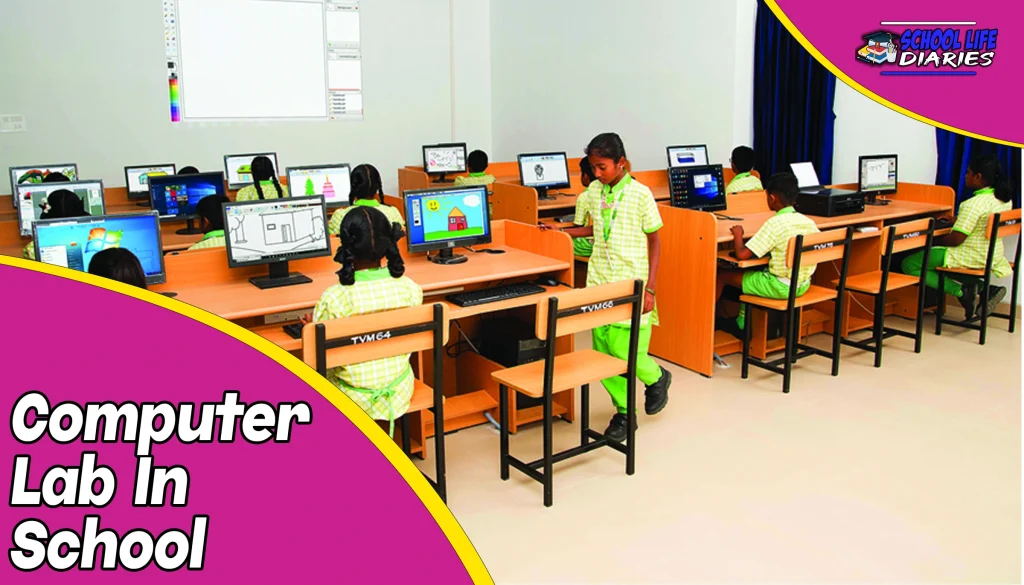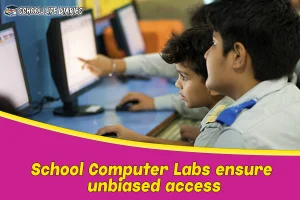In today’s digital era, the integration of technology in education has become increasingly crucial. One significant aspect of this integration is the presence of computer labs in schools. A computer lab in a school refers to a dedicated space equipped with computers and other technological resources for educational purposes.
The use of computer labs in schools extends beyond mere exposure to technology. It allows students to develop essential skills such as information literacy, critical thinking, problem-solving, and collaboration. By providing access to various software programs and online resources, computer labs enable students to engage actively in research, analysis, and creativity.
What is a computer lab in a school?
A computer lab in a school is a designated space equipped with multiple computers and necessary software to facilitate technological learning and enhance students’ digital literacy skills. The benefits of having a computer lab in schools are numerous. The equipment found in a computer lab is carefully selected to cater to the needs of students across various grade levels.
In order for both teachers and students to make effective use of the computer lab, training plays a crucial role. Teachers need training on how best to integrate technology into their lessons, ensuring that they are able to effectively deliver content using digital resources. Similarly, students benefit from training sessions where they can develop proficiency in using different software applications, improving their digital literacy skills which are now considered essential in our technology-driven society.
Overall, a computer lab in school offers numerous benefits by providing access to technology, offering specialized equipment suited for educational purposes, and facilitating necessary training for both teachers and students alike. It serves as an important resource that enhances technological learning experiences while fostering collaboration among peers.
What is the purpose of having a computer lab in school?
One of the key justifications for having a dedicated space for students to engage with technological resources and tools is to provide them with an environment conducive to exploring, experimenting, and acquiring the essential digital literacy skills necessary for success in today’s increasingly technology-driven world.
The purpose of having a computer lab in school is to offer students access to computers, software applications, and the internet that they may not have at home. This enables them to develop proficiency in using various technologies, such as word processing programs, spreadsheets, graphic design tools, and coding platforms.
The benefits of having a computer lab extend beyond technical competency. It also allows students to collaborate on projects that require digital tools or research. In this shared space, they can work together and learn from one another’s expertise or unique perspectives. The importance of having a computer lab in schools cannot be overstated in today’s society where technology plays an integral role in almost every aspect of life. Digital literacy has become an essential skill set for future employment prospects and overall participation in society.
How are computer labs used in school?
Computer labs are utilized by students to engage in hands-on learning experiences with technology, allowing them to explore digital tools and resources that enhance their understanding and application of academic concepts.
These labs provide a space where students can actively participate in interactive learning activities that promote critical thinking and problem-solving skills. By using computers, students have the opportunity to collaborate with their peers, conduct online research, and develop important digital literacy skills.
One of the primary benefits of computer labs is that they enable students to become proficient in using various digital tools and technologies. Through interactive learning activities facilitated by computer programs and software, students can practice and improve their skills in areas such as coding, graphic design, video editing, and more.
Overall, computer labs serve as a valuable resource for schools because they provide an environment where students can engage in interactive learning experiences that enhance their digital literacy skills while also honing their ability to conduct effective online research.
Reasons Why School Computer Labs Still Matter
School computer labs are essential in ensuring unbiased access to technology for all students.
By providing a centralized location with equal access to computers and software, schools can bridge the digital divide that exists outside of the classroom. These labs also offer advanced resources such as specialized software and high-performance workstations which can enhance the learning experience for students.
School Computer Labs ensure unbiased access
Ensuring equal access to technological resources, computer labs in educational institutions serve as an impartial platform for students to explore and utilize digital tools. These labs provide uninterrupted learning opportunities for all students, regardless of their socioeconomic background or access to technology at home. By having a dedicated space with computers and internet connectivity, schools can bridge the digital divide and ensure that every student has an equal opportunity to enhance their technological skills.
In today’s increasingly digital world, possessing technological skills is crucial for success in various fields. This lack of access can create disparities in learning outcomes and hinder students’ ability to develop essential digital competencies. School computer labs play a vital role in addressing this issue by providing a leveled playing field where all students can acquire and refine their technological skills. The communal setting encourages peer-to-peer learning and allows individuals with varying levels of expertise to help one another grow.
School computer labs ensure unbiased access by providing uninterrupted learning opportunities and equal chances for enhancing technological skills. These spaces break down barriers created by unequal access outside the classroom and foster collaboration among diverse groups of learners. As technology continues to shape our lives, it is imperative that educational institutions prioritize equitable access to digital resources through well-equipped computer labs.
Modern computer labs promote collaboration
Collaborative learning environments in educational institutions are enhanced through the integration of modern computer labs. These labs provide students with the necessary tools and resources to work together on projects, assignments, and research. By promoting collaboration, computer labs encourage students to share ideas, exchange knowledge, and learn from one another. This not only enhances their learning experience but also fosters teamwork skills that are essential for success in the professional world.
Modern computer labs offer various features that facilitate collaborative work. For instance, they have large screens or projectors that allow multiple students to view and discuss information simultaneously. This promotes active participation and engagement among students as they can collectively analyze data, solve problems, or present their findings.
Modern computer labs play a vital role in promoting collaboration and enhancing learning in educational institutions. They provide an environment where students can engage in teamwork activities and leverage technology to support their academic endeavors. By fostering collaboration among peers and offering resources for collective work, computer labs contribute to creating a dynamic educational setting that prepares students for future challenges requiring effective teamwork skills.
Advanced resources for students
Advanced resources such as cutting-edge technology and specialized software greatly enhance students’ learning experiences in modern computer labs. These resources provide opportunities for interactive learning, allowing students to actively engage with the material and develop important technological skills. Interactive learning is a highly effective method that promotes student engagement and deepens their understanding of the subject matter.
In modern computer labs, students have access to various advanced resources that facilitate interactive learning. For instance, they can use simulation software to conduct virtual experiments or simulations that would be otherwise impossible in a traditional classroom setting. This hands-on approach not only enables students to apply theoretical concepts but also fosters critical thinking and problem-solving skills.
As technology continues to advance rapidly in today’s society, having proficiency in various digital tools has become essential for success in many fields. Computer lab environments provide an ideal setting for students to explore different software applications, learn coding languages, or develop multimedia presentations. By gaining practical experience with these technologies, students are better prepared for future academic pursuits and professional endeavors.
Workstations Can Provide More
Expanding the capabilities of workstations can significantly enhance the learning experience for students in modern educational settings. By providing advanced resources and tools, workstations can increase productivity and facilitate enhanced learning. Students can access a wide range of software applications and online resources that allow them to explore complex concepts, conduct research, and develop critical thinking skills.
With improved skills, students are better equipped to tackle academic challenges and excel in their studies. Workstations offer opportunities for hands-on learning, where students can engage in interactive simulations or virtual experiments that may not be feasible in a traditional classroom setting. This practical approach fosters a deeper understanding of subjects by allowing students to apply theoretical knowledge to real-world scenarios. Expanding the capabilities of workstations in computer labs is essential for creating an enriched learning environment for students. The increased productivity facilitated by advanced resources allows students to delve deeper into subjects while improving their skills simultaneously.
Write some disadvantages of computer lab in school:
A potential drawback of having a computer lab in school is the tendency for students to become overly reliant on technology, which can hinder their development of essential critical thinking and problem-solving skills. While computers provide instant access to information and facilitate quick completion of tasks, this convenience may lead students to rely on these machines rather than hone their analytical abilities.
Another disadvantage of computer labs in schools is the potential for distractions and misuse. With internet access at their fingertips, students may be tempted to visit websites or engage in activities unrelated to their academic work. Social media platforms, online gaming sites, and other entertainment options can easily divert their attention from educational tasks.
While computer labs in schools offer numerous benefits, there are several drawbacks that should be considered. Overreliance on technology can hinder the development of critical thinking skills among students as they become dependent on machines for problem-solving tasks. Distractions posed by internet access can divert attention away from academic work and diminish productivity within these spaces designed for educational purposes.
Can students use the computer lab outside of regular class hours?
Outside of regular class hours, students have the opportunity to utilize the computer lab for additional academic pursuits and independent research. The extended access provided by the computer lab allows students to work on their assignments or projects at their own pace without any time constraints. This flexibility enables them to delve deeper into their subjects and explore various resources online that may not be available in a traditional classroom setting.
The extended access to the computer lab offers students the freedom to work on their academic endeavors beyond scheduled classes. This flexibility is particularly valuable for those who may need extra time or specific software applications that may not be readily available elsewhere. Students can take advantage of this resource to complete assignments, conduct research, or collaborate with peers on group projects. They can use this time to pursue personal interests, engage in online courses or tutorials, and explore new areas of knowledge.
Offering extended access to the computer lab outside of regular class hours provides students with increased flexibility and fosters independent learning opportunities. It allows them to work at their own pace and explore diverse resources online without any time limitations. By utilizing this facility, students gain invaluable digital skills while becoming proactive learners who actively seek out knowledge beyond what is taught in class.
Is internet access available in school computer labs?
Internet access is a fundamental resource available within the confines of the academic computer facility. It serves as a vital tool for students to enhance their learning experience and broaden their knowledge. These limitations are put in place to ensure student safety and prevent misuse of online resources. By implementing internet restrictions, schools can create a secure environment where students can navigate the digital world responsibly.
While internet access in school computer labs provides numerous educational benefits, it also raises concerns regarding student privacy. Schools have a responsibility to protect students’ personal information and ensure their online safety. With technological advancements shaping our society, it is essential for students to develop skills that enable them to effectively navigate and utilize digital resources.
Computer labs offer opportunities for students to learn how to conduct research, evaluate online sources for credibility, collaborate on projects using various digital tools, and develop critical thinking skills related to technology usage. By incorporating digital literacy training into the curriculum through computer lab sessions, schools empower students with the necessary skills for success in today’s increasingly connected world.
Conclusion
In conclusion, computer labs in schools play a crucial role in providing students with access to technology and enhancing their learning experience. These labs are dedicated spaces equipped with computers and internet connectivity, allowing students to develop their digital literacy skills and explore various educational resources. The purpose of having a computer lab in school is to ensure that all students have equal opportunities to use technology for educational purposes.
Computer labs are used in schools for a variety of reasons. They provide students with the necessary tools and software to complete assignments, conduct research, and collaborate on projects. Despite the advantages of computer labs, there are some disadvantages as well. Limited availability of computers or overcrowded labs can restrict access for certain students, making it difficult for them to fully utilize these resources.
In terms of accessibility, some schools allow students to use the computer lab outside regular class hours for additional practice or research. This flexibility enables students to further enhance their digital skills and take advantage of the resources provided by the lab. Regarding internet access, most school computer labs have reliable internet connections that allow students to browse online resources relevant to their studies and engage in online collaborative activities.















